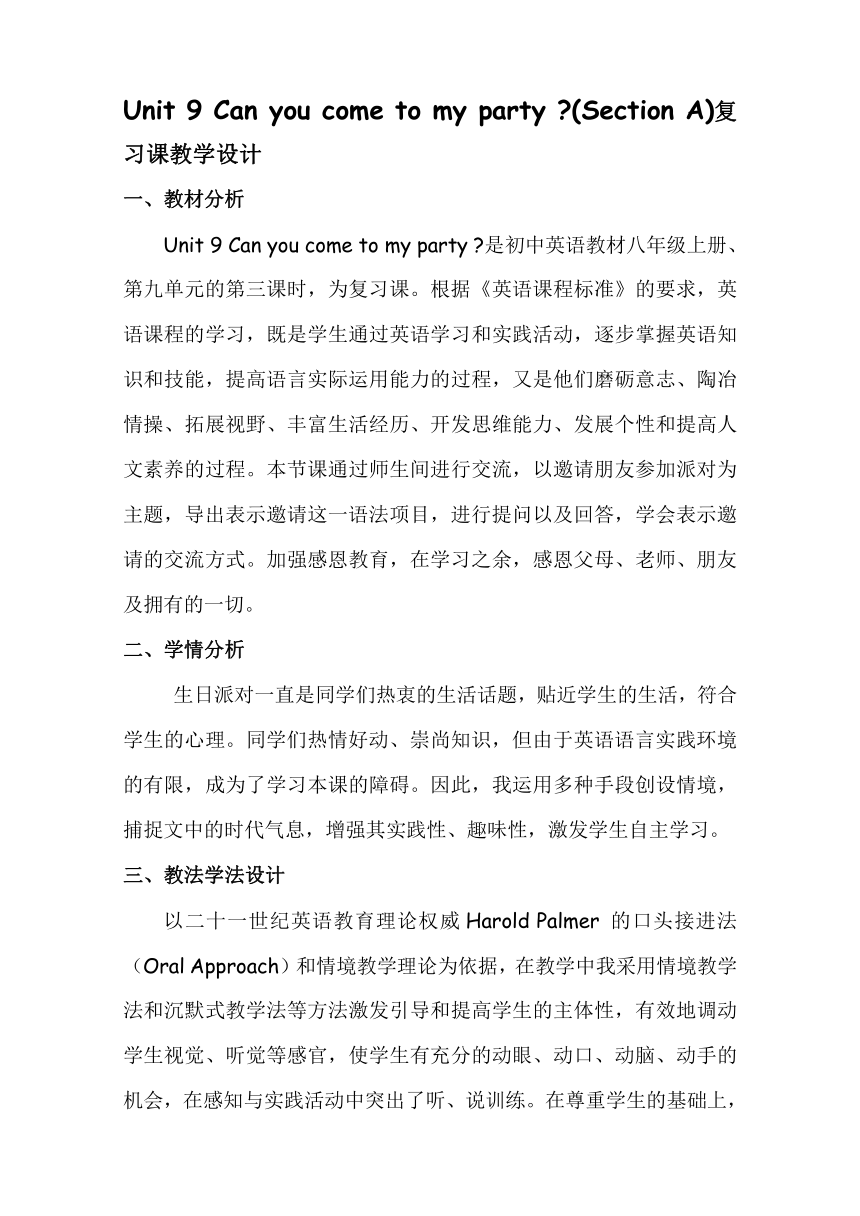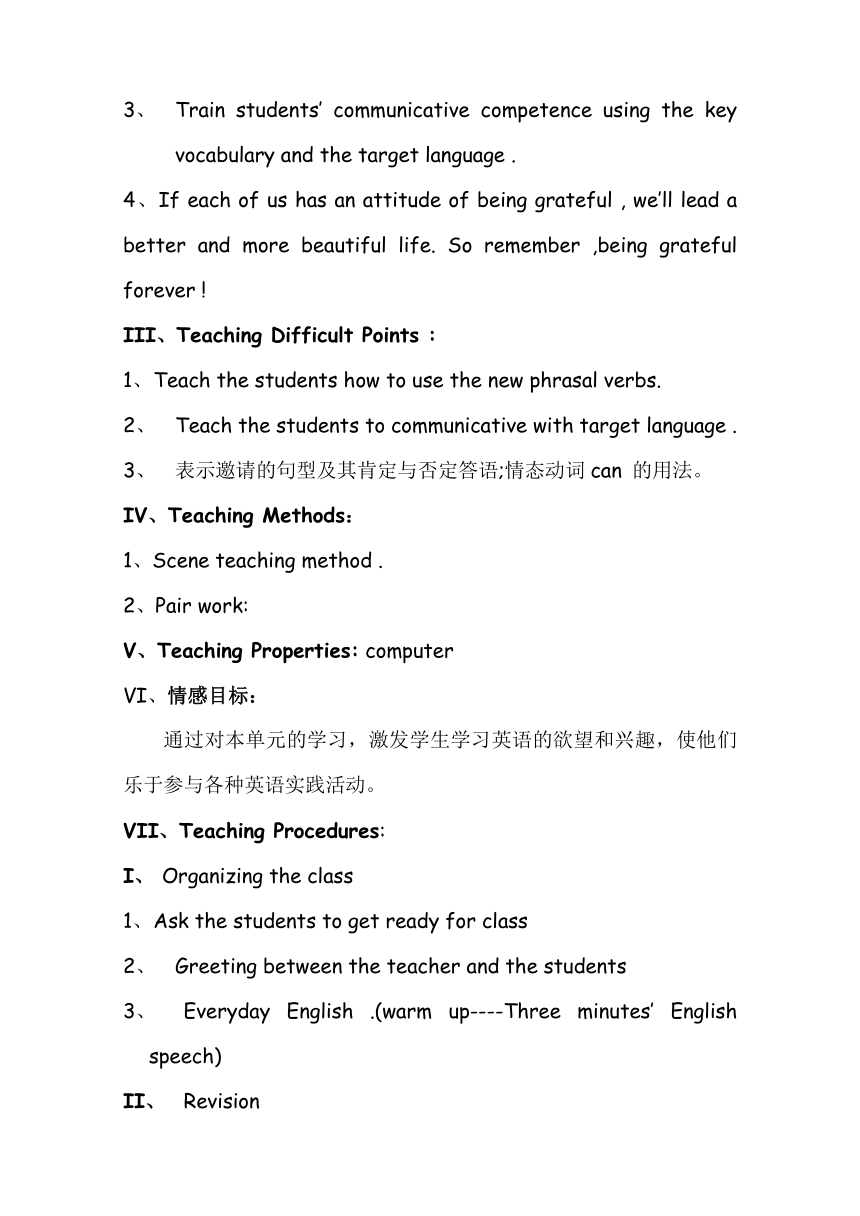人教版八年级上册英语Unit 9 Can you come to my party?SectionA Grammar focus 3a-3c 教案
文档属性
| 名称 | 人教版八年级上册英语Unit 9 Can you come to my party?SectionA Grammar focus 3a-3c 教案 |  | |
| 格式 | doc | ||
| 文件大小 | 59.0KB | ||
| 资源类型 | 教案 | ||
| 版本资源 | 人教新目标(Go for it)版 | ||
| 科目 | 英语 | ||
| 更新时间 | 2022-11-12 18:32:29 | ||
图片预览



文档简介
Unit 9 Can you come to my party (Section A)复习课教学设计
一、教材分析
Unit 9 Can you come to my party 是初中英语教材八年级上册、第九单元的第三课时,为复习课。根据《英语课程标准》的要求,英语课程的学习,既是学生通过英语学习和实践活动,逐步掌握英语知识和技能,提高语言实际运用能力的过程,又是他们磨砺意志、陶冶情操、拓展视野、丰富生活经历、开发思维能力、发展个性和提高人文素养的过程。本节课通过师生间进行交流,以邀请朋友参加派对为主题,导出表示邀请这一语法项目,进行提问以及回答,学会表示邀请的交流方式。加强感恩教育,在学习之余,感恩父母、老师、朋友及拥有的一切。
二、学情分析
生日派对一直是同学们热衷的生活话题,贴近学生的生活,符合学生的心理。同学们热情好动、崇尚知识,但由于英语语言实践环境的有限,成为了学习本课的障碍。因此,我运用多种手段创设情境,捕捉文中的时代气息,增强其实践性、趣味性,激发学生自主学习。
三、教法学法设计
以二十一世纪英语教育理论权威Harold Palmer 的口头接进法(Oral Approach)和情境教学理论为依据,在教学中我采用情境教学法和沉默式教学法等方法激发引导和提高学生的主体性,有效地调动学生视觉、听觉等感官,使学生有充分的动眼、动口、动脑、动手的机会,在感知与实践活动中突出了听、说训练。在尊重学生的基础上,集中学生的智慧,参考学生的意见,教师进行有效的指导,使课堂教学更具灵活性、主动性、更富有创造性。用实物演示情境、用图画再现情境、用音乐渲染情境、以表演体会情境、以生活展现情境、用语言描绘情境,把学生带入所学情境之中,从而使学生更好地理解和掌握所学语言内容。
最好的教法是最好的学法。我国著名教育家叶圣陶先生提出了“教是为了不教”的精辟名言,主张培养学生独立思考解决问题的能力,把学习的主动性还给学生。“授之以鱼,不如授之以渔”,我以讨论、展示、练习、竞赛等形式,让学生“自主学习”,主动探究,积极主动的展示英语,使学法与教法有机结合,最大限度的提高学习效果。
四、教学过程设计:
I、Teaching Period : The third period
II、Teaching Aims and Demands:
1、 Important words: prepare, prepare for, exam, go to the doctor, flu, available, until, hang, hang out, catch, invite, accept, refuse, the day before yesterday ,the day before tomorrow,
2、 Sentences: Can you come to my party on Saturday
Sure , I’d love to .
Sorry , I must study for a test..
Can you go to the movies tomorrow night
Sure. That sounds great .
I’m afraid not. I have the flu.
3、 Train students’ communicative competence using the key vocabulary and the target language .
4、If each of us has an attitude of being grateful , we’ll lead a better and more beautiful life. So remember ,being grateful forever !
III、Teaching Difficult Points :
1、 Teach the students how to use the new phrasal verbs.
2、 Teach the students to communicative with target language .
3、 表示邀请的句型及其肯定与否定答语;情态动词can 的用法。
IV、Teaching Methods:
1、Scene teaching method .
2、Pair work:
V、Teaching Properties: computer
VI、情感目标:
通过对本单元的学习,激发学生学习英语的欲望和兴趣,使他们乐于参与各种英语实践活动。
VII、Teaching Procedures:
I、 Organizing the class
1、 Ask the students to get ready for class
2、 Greeting between the teacher and the students
3、 Everyday English .(warm up----Three minutes’ English speech)
II、 Revision
Revise the language points in unit 6.Ask some sentences like this :What do you usually do on weekends What are you going to be when you grow up
III、 New lesson:
1.Spread the lesson
Boys and girls : What do you usually do on weekends Tomorrow is my birthday .Can you come to my party tomorrow Today we’re going to review Unit 9 Can you come to my party
2. Look、Listen and speak
This activity introduces the key vocabulary and provides some practice .In this unit we learn to use “Can you come to …… “ .用问题引入,让学生就问题进行联想,板书课题,以此训练学生发散思维。
3.Practise with English 通过小组合作、师生合作、生生合作的学习模式,进行本课的对话练习,让学生轻松的掌握所学内容。
4.Language points: teaching some important language points .
(1) Can you come to my party
知识点 情态动词can 的用法
Can 是情态动词,意思是能、会、可能。
用法:
①表示能力。 He can speak English.
②表示许可,请求等。Can you come to my party
③表示可能。 Anybody can make mistakes .
※※※Can 邀请某人做某事,当提出请求时,通常用下列句型:
“Can you …… ”两种回答:
接受时用“Sure, I’d love to .”
拒绝时用“Sorry, I have to ….;Sure , I’d love to ,but I have to ……;
I’m afraid I have to ……”
(2)短语: on Saturday afternoon , have to , prepare for , go to the doctor, have the flu help my parents, come to the party , meet my friend, go to the party ,too much homework , go to the movies, another time
5.Let’s study 以小组讨论形式,完成练习,检测了学生对细节的理解准确度,又培养了学生的使用精神,合作中,学生之间相互启发,相互学习,思维由集中到发散,又由发散而集中,个人的思维在集体的智慧中闪光。
6.Let’s demonstrate第斯多惠说过:“教学的艺术不在于传授本领,而在于激励、唤醒。给学生一定的时间,让学生自己去练习、去展示,把学习的自主性还给学生,更好地为学生创设语言环境。
7.Let’s practice 检测学生对本节知识的理解与应用,达到综合运用提升的目的。
VIII、Summary :
Encourage the students to be grateful . I think you should be grateful for life even when we are unsuccessful or unlucky .We have many reasons for being grateful .Thanks for our parents! Thanks for our teachers ! Thanks for our friends ! If each of us has an attitude of being grateful , we’ll lead a better and more beautiful life. So remember ,being grateful forever !
You are the hope of our e on ! You’ll be the best !
Blackboard Design :
Unit 9 Can you come to my party
※※※Can 邀请某人做某事,当提出请求时:
“Can you …… ”两种回答:
接受时用“Sure, I’d love to .”
拒绝时用“Sorry, I have to ….;Sure , I’d love to ,but I have to ……;
I’m afraid I have to ……”
一、教材分析
Unit 9 Can you come to my party 是初中英语教材八年级上册、第九单元的第三课时,为复习课。根据《英语课程标准》的要求,英语课程的学习,既是学生通过英语学习和实践活动,逐步掌握英语知识和技能,提高语言实际运用能力的过程,又是他们磨砺意志、陶冶情操、拓展视野、丰富生活经历、开发思维能力、发展个性和提高人文素养的过程。本节课通过师生间进行交流,以邀请朋友参加派对为主题,导出表示邀请这一语法项目,进行提问以及回答,学会表示邀请的交流方式。加强感恩教育,在学习之余,感恩父母、老师、朋友及拥有的一切。
二、学情分析
生日派对一直是同学们热衷的生活话题,贴近学生的生活,符合学生的心理。同学们热情好动、崇尚知识,但由于英语语言实践环境的有限,成为了学习本课的障碍。因此,我运用多种手段创设情境,捕捉文中的时代气息,增强其实践性、趣味性,激发学生自主学习。
三、教法学法设计
以二十一世纪英语教育理论权威Harold Palmer 的口头接进法(Oral Approach)和情境教学理论为依据,在教学中我采用情境教学法和沉默式教学法等方法激发引导和提高学生的主体性,有效地调动学生视觉、听觉等感官,使学生有充分的动眼、动口、动脑、动手的机会,在感知与实践活动中突出了听、说训练。在尊重学生的基础上,集中学生的智慧,参考学生的意见,教师进行有效的指导,使课堂教学更具灵活性、主动性、更富有创造性。用实物演示情境、用图画再现情境、用音乐渲染情境、以表演体会情境、以生活展现情境、用语言描绘情境,把学生带入所学情境之中,从而使学生更好地理解和掌握所学语言内容。
最好的教法是最好的学法。我国著名教育家叶圣陶先生提出了“教是为了不教”的精辟名言,主张培养学生独立思考解决问题的能力,把学习的主动性还给学生。“授之以鱼,不如授之以渔”,我以讨论、展示、练习、竞赛等形式,让学生“自主学习”,主动探究,积极主动的展示英语,使学法与教法有机结合,最大限度的提高学习效果。
四、教学过程设计:
I、Teaching Period : The third period
II、Teaching Aims and Demands:
1、 Important words: prepare, prepare for, exam, go to the doctor, flu, available, until, hang, hang out, catch, invite, accept, refuse, the day before yesterday ,the day before tomorrow,
2、 Sentences: Can you come to my party on Saturday
Sure , I’d love to .
Sorry , I must study for a test..
Can you go to the movies tomorrow night
Sure. That sounds great .
I’m afraid not. I have the flu.
3、 Train students’ communicative competence using the key vocabulary and the target language .
4、If each of us has an attitude of being grateful , we’ll lead a better and more beautiful life. So remember ,being grateful forever !
III、Teaching Difficult Points :
1、 Teach the students how to use the new phrasal verbs.
2、 Teach the students to communicative with target language .
3、 表示邀请的句型及其肯定与否定答语;情态动词can 的用法。
IV、Teaching Methods:
1、Scene teaching method .
2、Pair work:
V、Teaching Properties: computer
VI、情感目标:
通过对本单元的学习,激发学生学习英语的欲望和兴趣,使他们乐于参与各种英语实践活动。
VII、Teaching Procedures:
I、 Organizing the class
1、 Ask the students to get ready for class
2、 Greeting between the teacher and the students
3、 Everyday English .(warm up----Three minutes’ English speech)
II、 Revision
Revise the language points in unit 6.Ask some sentences like this :What do you usually do on weekends What are you going to be when you grow up
III、 New lesson:
1.Spread the lesson
Boys and girls : What do you usually do on weekends Tomorrow is my birthday .Can you come to my party tomorrow Today we’re going to review Unit 9 Can you come to my party
2. Look、Listen and speak
This activity introduces the key vocabulary and provides some practice .In this unit we learn to use “Can you come to …… “ .用问题引入,让学生就问题进行联想,板书课题,以此训练学生发散思维。
3.Practise with English 通过小组合作、师生合作、生生合作的学习模式,进行本课的对话练习,让学生轻松的掌握所学内容。
4.Language points: teaching some important language points .
(1) Can you come to my party
知识点 情态动词can 的用法
Can 是情态动词,意思是能、会、可能。
用法:
①表示能力。 He can speak English.
②表示许可,请求等。Can you come to my party
③表示可能。 Anybody can make mistakes .
※※※Can 邀请某人做某事,当提出请求时,通常用下列句型:
“Can you …… ”两种回答:
接受时用“Sure, I’d love to .”
拒绝时用“Sorry, I have to ….;Sure , I’d love to ,but I have to ……;
I’m afraid I have to ……”
(2)短语: on Saturday afternoon , have to , prepare for , go to the doctor, have the flu help my parents, come to the party , meet my friend, go to the party ,too much homework , go to the movies, another time
5.Let’s study 以小组讨论形式,完成练习,检测了学生对细节的理解准确度,又培养了学生的使用精神,合作中,学生之间相互启发,相互学习,思维由集中到发散,又由发散而集中,个人的思维在集体的智慧中闪光。
6.Let’s demonstrate第斯多惠说过:“教学的艺术不在于传授本领,而在于激励、唤醒。给学生一定的时间,让学生自己去练习、去展示,把学习的自主性还给学生,更好地为学生创设语言环境。
7.Let’s practice 检测学生对本节知识的理解与应用,达到综合运用提升的目的。
VIII、Summary :
Encourage the students to be grateful . I think you should be grateful for life even when we are unsuccessful or unlucky .We have many reasons for being grateful .Thanks for our parents! Thanks for our teachers ! Thanks for our friends ! If each of us has an attitude of being grateful , we’ll lead a better and more beautiful life. So remember ,being grateful forever !
You are the hope of our e on ! You’ll be the best !
Blackboard Design :
Unit 9 Can you come to my party
※※※Can 邀请某人做某事,当提出请求时:
“Can you …… ”两种回答:
接受时用“Sure, I’d love to .”
拒绝时用“Sorry, I have to ….;Sure , I’d love to ,but I have to ……;
I’m afraid I have to ……”
同课章节目录
- Unit 1 Where did you go on vacation?
- Section A
- Section B
- Unit 2 How often do you exercise?
- Section A
- Section B
- Unit 3 I'm more outgoing than my sister.
- Section A
- Section B
- Unit 4 What's the best movie theater?
- Section A
- Section B
- Unit 5 Do you want to watch a game show?
- Section A
- Section B
- Unit 6 I'm going to study computer science.
- Section A
- Section B
- Unit 7 Will people have robots?
- Section A
- Section B
- Unit 8 How do you make a banana milk shake?
- Section A
- Section B
- Unit 9 Can you come to my party?
- Section A
- Section B
- Unit 10 If you go to the party, you'll have a grea
- Section A
- Section B
